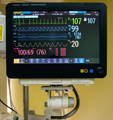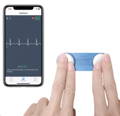What Is an Electrocardiogram (EKG/ECG) ?
What Is an Electrocardiogram (EKG/ECG) ?
1. What is ECG
An electrocardiogram, also known as an ECG/EKG, monitors the number and interval of a test subject's heartbeat and then records the results in a chart. This chart gives a better view of a person's heart health, and if there is a problem with the heart, it will be indicated on the ECG.

The ECG contains a wealth of information about the basic functions and pathology of the heart and reflects the rhythm and electrical activity processes of the heart, so it has a major role and significance in the safety assessment of the heart and the evaluation of various therapies, and is currently the most common and accurate non-invasive means of analyzing and identifying various cardiovascular diseases.
The availability of ECG makes it easier for doctors to diagnose patients' conditions and enables patients to better observe their own heart health.
2. Principle of ECG
The simple principle of ECG: ECG is a technique that uses an ECG machine to record the changes in the electrical activity of the heart during each cardiac cycle from the body surface. Therefore, in theory, all diseases that can cause changes in the electrical activity of the heart should be detected by ECG.
3. Explanation of technical terms

What do these technical terms in ECG mean? Next we look together at:
•P wave: Reflects the process of electrical excitation of the left and right atria, also called atrial depolarization wave. The starting point of the P wave indicates the beginning of excitation of the sinus node and the end point indicates the end of excitation of both atria. (Time <0.11 s, amplitude,0.25mv in limb lead, 0.2mv in chest lead)
• P-R interval (Note: different from P-R segment): It indicates the time required for excitation from the sinoatrial node, through the interjunctional conduction bundle, atrioventricular junctional area, and ventricular muscle excitation. (Time 0.12-0.20s)

• QRS wave group: Represents all ventricular myocardial excitation, (time 0.06~0.1s, amplitude, refer to each lead, standard varies from lead to lead)
• S-T segment: Represents the time between the completion of ventricular depolarization and the beginning of repolarization. (normal condition with baseline basic level)
•T wave: Repolarization wave of the ventricle. (generally in the same direction as the main wave)
•U wave: Generally considered to be the repolarization wave of Pope's fiber.
4. Does it hurt when I perform ECG monitoring?
Actually not, it only monitors the electrical signals of the heart by means of ECG sticker electricity, not transmitting any current, so there is no pain. So people who are worried about having an ECG test don't have to worry about painful situations occurring.
5. When should I have an ECG test?
You may need to have an ECG test if you have
• Afib heart rhythm abnormalities (arrhythmias)
• If an artery in your heart is blocked or narrowed (coronary artery disease) causing chest pain or a heart attack
• If you have had a heart attack before
• How well certain treatments for heart disease (such as a pacemaker) are working

You may need an electrocardiogram if you have any of the following signs and symptoms.
• dizziness or lightheadedness
• chest tightness
• heart palpitations
• Darkness in the eyes
• Fatigue, weakness or decreased ability to exercise
• Feeling uncomfortable in the heart area
6. Products for ECG test
• Conventional ECG Machine
The purpose of rapid ECG testing is the screening and clinical diagnosis of arrhythmias and abnormal ECG waveforms.
Use scenario: mainly used for cardiac examination, physical examination, first consultation of some diseases, routine preoperative examination, etc.
Advantages: the ECG recorded by conventional ECG machine is of the highest quality, mainly in the number of ECG leads is relatively large, generally 12 leads, and the de frequency response range is relatively wide, generally 0.05~150Hz.
Disadvantages: not convenient to carry, use requires the patient to be in a resting state (generally supine), test time is generally less than 10 seconds.
• Vital Signs Monitor
ECG monitor is actually multi-parameter monitoring, because it not only has ECG monitoring, but also pulse wave, oxygen saturation, respiration, blood pressure, and even body temperature monitoring, so it is also called multi-participant monitor.
Use scenario: In the hospital, this equipment is generally needed for monitoring patients in the book, postoperative, postpartum, and critical illness.
Advantage: can monitor a variety of parameters and can continuously monitor.
Disadvantages: not convenient to carry.
• Holter/Protable ECG Monitor
The 24-hour ambulatory ECG recording is performed at home and then brought back to the hospital, where the doctor analyzes it with software to give a report and diagnosis. The quality is between conventional ECG machines and Vital signs monitor, with a frequency response range of 0.5 to 40Hz.
Use scenario: at home, mainly used for ECG monitoring, with less restrictions on the time and place of use
Advantages: it is very convenient for patients to record ECG data freely at home.
Disadvantages: patient activity can still have some effects on the data.
7.PRODUCT RECOMMENDATION
• Compared with heavy ECG meters, Wellue ECG Recorder with AI Analysis is very easy to carry and use, and can be applied to more scenarios: work, home and travel. We can enjoy the convenience brought to you by Protable ECG Monitor, which really achieves to guard your health anytime and anywhere.
• In addition, 24-hour ECG recording can help the doctor screen undiagnosed heart problems and determine how well the treatment is working. Because abnormal heart rhythms may only occur now and then. Monitoring for a longer period of time is necessary to record these events, which helps doctors see why the wearer experiences heart-related symptoms, such as chest pain, shortness of breath, dizziness, fainting...
• Not to be overlooked is the fact that ECGs can be recorded continuously for up to 72 hours per charge, which greatly facilitates our use.
• Wellue ECG Recorder with AI Analysis is also very accurate in terms of measurement data. powerful AI algorithm interprets the recorded ECG, makes it easy for everyone to understand.
• It is important to note that this product allows instant ECG analysis and is free to use. Easily share the data with doctors.
Join Wellue and keep your heart healthy.





